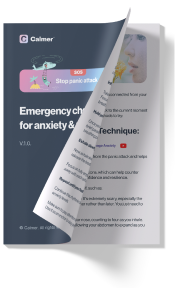Key Takeaways:
- You’re not alone. Career anxiety hits us all at some point
- From fear of failure to uncertainty about the future, it arises from many different sources
- There are proven ways you can regain confidence and control once again
Do you want to change your career or just change jobs? Do you think you’re not doing enough or that your work isn’t the best? Or maybe your boss is constantly breathing down your neck.
Well, you’re not alone. Career anxiety is a common hurdle that many of us face at some point in our lives.

There are, however, ways to deal with this that can get you back on track. In this article, we’ll talk about practical tips to help you feel more confident and in control.
So, whether you’re doubting yourself, unsure about the future, or feeling stuck, all is not lost.
What Causes Career Anxiety?
Career or work anxiety can pop up when you’re just entering the workforce, switching jobs, getting performance reviews, facing job loss, having more responsibilities, feeling stuck in your career, and many other situations.
Here are some common causes of career anxiety:
- Fear of failure
- Uncertainty about the future
- Lack of control
- Job insecurity
- Work-life imbalance
- Lack of support
- Comparison and competition
- Not getting paid enough
Figuring out why you’re stressed about your career helps you tackle the problem. Once you know what’s bothering you, you can do something about it.
How to Overcome Career Anxiety
I had my worst case of career anxiety when I found myself unexpectedly promoted to a high-stakes managerial position without much prior experience.
To complicate things even more, I lacked an assistant manager and had two newly appointed supervisors reporting to me.
Initially, I felt overwhelmed and ill-prepared for the challenge. Managing a team seemed like an impossible task, especially without the necessary experience or support structure in place.
However, I approached the situation with resolve and a willingness to learn. But ultimately, even that wasn’t enough, as I had the misfortune of dealing with a less-than-ideal area manager. This added another layer of complexity to an already daunting situation.
In the end, the weight of the challenges I faced became too much to bear, and I made the difficult decision to quit.
Even though I tried my hardest to deal with the challenges of being inexperienced, lacking support, and dealing with a not-so-great area manager, I came to the conclusion that sticking around in that situation wasn’t doing me or the company any favors.
Here’s what helped me get out of this tough spot, change careers completely, and finally feel like I’m in the right spot.
Identify the Source
First things first, pinpoint what’s causing your career anxiety. Is it fear of failure, uncertainty about the future, or perhaps feeling stuck in your current role? Understanding the root cause of this anxiety will help you address it more effectively.
So, take a deep breath, grab a pen and paper, and jot down your thoughts and feelings. Be honest with yourself, even if it feels uncomfortable. See this as your first step toward reclaiming control.
What Are Your Abilities and Interests?
Instead of just ticking off a list of skills or hobbies, take the time to reflect on your experiences, both past and present. What tasks or activities do you find yourself drawn to?
What challenges have you overcome, and what have you learned from them? What makes you lose track of time because you’re so immersed in it?
Consider your values, too. What principles or beliefs are important to you? How do you want to make a difference in the world through your work, your hobbies, or your relationships?
Think of it as uncovering your hidden treasures. You might discover talents you never knew you had or uncover passions you didn’t realize were there.
Most importantly, don’t expect to do this in a couple of hours or days. It could take weeks or even months to fully flesh this out.
Confront Your Fears
You also need to acknowledge your fears. Name them, write them down, whatever helps you bring them out into the open.
Then, ask yourself: what’s the worst that could happen? Often, our fears seem much scarier in our heads than they do when we shine a light on them.
Next, challenge your fears. Are they based on facts, or are they just stories you’ve been telling yourself? Look for evidence that contradicts your fears and reminds you of your strengths and capabilities.
For example, your new role requires you to give presentations in front of your colleagues. You’re naturally worried about that and would rather quit your job if it were possible.
The solution isn’t quitting but challenging this fear by practicing your presentation multiple times and visualizing yourself delivering it confidently.
Focus on the value of the information you’re sharing and the opportunity to showcase your expertise.
Even if you make a mistake, it’s not the end of the world because everyone makes mistakes.
Focus on What You Can Control
The above was an example of how you should focus on what you can control. You need to direct your energy and efforts toward the things you have power over instead of getting swept away by circumstances beyond your control.
So, what can you control? You can mostly control your thoughts, actions, and decisions. You can’t control external factors like the economy or your company’s policies, but you can control how you respond to them.
You can also choose how you react to challenging situations. Instead of focusing on the negatives, focus on finding solutions and keeping a positive outlook.
You’re the boss of how much effort you put into your work and personal development. Set some goals and stick to them by taking small steps every day. That way, you’re moving forward, no matter what’s going on around you.
You also get to decide how you react when things don’t go your way. Instead of letting criticism or setbacks bring you down, you can use mindfulness and emotional regulation techniques to respond in a positive and helpful way.
I learned that this helps you stay focused on your big-picture goals and keeps you moving forward, even when things get tough.
At the end of the day, you’re the boss of your career, relationships, and lifestyle. Make choices that match what’s important to you and what makes you happy. By following your heart and staying true to yourself, you can build a life that feels real and rewarding.
The Calmer Anxiety & Panic Attack Relief app can also help you with your career anxiety. It’s a new anxiety relief app packed with research-based tools and ideas for managing anxiety, panic attacks, and depression.
Its guided meditations, deep breathing exercises, and mindfulness practices can help you reduce stress, calm your mind, and acquire a new perspective on your career concerns.




